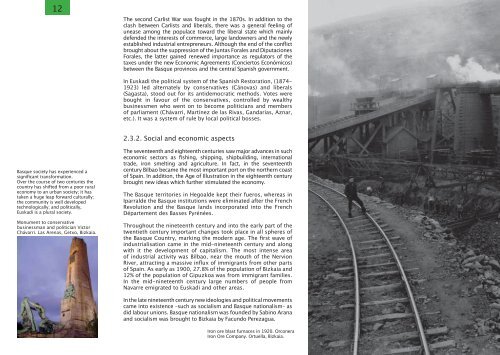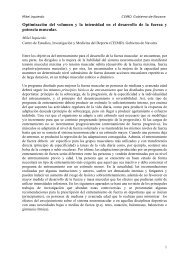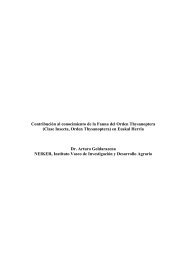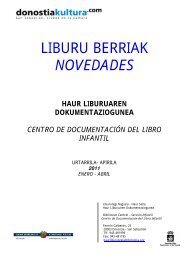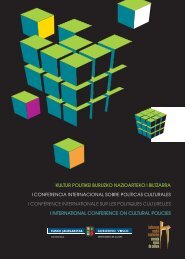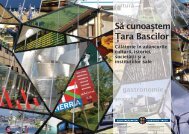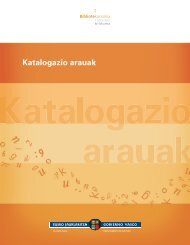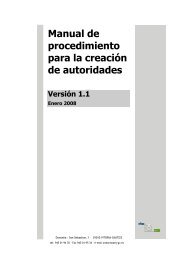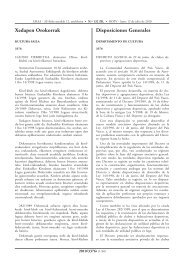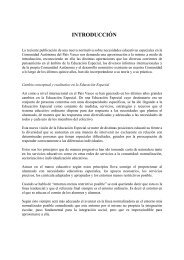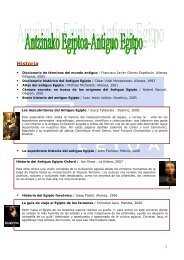The Basque Country (pdf, 4,3Mb) - Kultura Saila - Euskadi.net
The Basque Country (pdf, 4,3Mb) - Kultura Saila - Euskadi.net
The Basque Country (pdf, 4,3Mb) - Kultura Saila - Euskadi.net
Create successful ePaper yourself
Turn your PDF publications into a flip-book with our unique Google optimized e-Paper software.
12<br />
<strong>The</strong> second Carlist War was fought in the 1870s. In addition to the<br />
clash between Carlists and liberals, there was a general feeling of<br />
unease among the populace toward the liberal state which mainly<br />
defended the interests of commerce, large landowners and the newly<br />
established industrial entrepreneurs. Although the end of the conflict<br />
brought about the suppression of the Juntas Forales and Diputaciones<br />
Forales, the latter gained renewed importance as regulators of the<br />
taxes under the new Economic Agreements (Conciertos Económicos)<br />
between the <strong>Basque</strong> provinces and the central Spanish government.<br />
In <strong>Euskadi</strong> the political system of the Spanish Restoration, (1874-<br />
1923) led alternately by conservatives (Cánovas) and liberals<br />
(Sagasta), stood out for its antidemocratic methods. Votes were<br />
bought in favour of the conservatives, controlled by wealthy<br />
businessmen who went on to become politicians and members<br />
of parliament (Chávarri, Martínez de las Rivas, Gandarias, Aznar,<br />
etc.). It was a system of rule by local political bosses.<br />
2.3.2. Social and economic aspects<br />
<strong>Basque</strong> society has experienced a<br />
significant transformation.<br />
Over the course of two centuries the<br />
country has shifted from a poor rural<br />
economy to an urban society; it has<br />
taken a huge leap forward culturally;<br />
the community is well developed<br />
technologically; and politically,<br />
<strong>Euskadi</strong> is a plural society.<br />
Monument to conservative<br />
businessman and politician Victor<br />
Chávarri. Las Arenas, Getxo, Bizkaia.<br />
<strong>The</strong> seventeenth and eighteenth centuries saw major advances in such<br />
economic sectors as fishing, shipping, shipbuilding, international<br />
trade, iron smelting and agriculture. In fact, in the seventeenth<br />
century Bilbao became the most important port on the northern coast<br />
of Spain. In addition, the Age of Illustration in the eighteenth century<br />
brought new ideas which further stimulated the economy.<br />
<strong>The</strong> <strong>Basque</strong> territories in Hegoalde kept their fueros, whereas in<br />
Iparralde the <strong>Basque</strong> institutions were eliminated after the French<br />
Revolution and the <strong>Basque</strong> lands incorporated into the French<br />
Département des Basses Pyrénées.<br />
Throughout the ni<strong>net</strong>eenth century and into the early part of the<br />
twentieth century important changes took place in all spheres of<br />
the <strong>Basque</strong> <strong>Country</strong>, marking the modern age. <strong>The</strong> first wave of<br />
industrialisation came in the mid-ni<strong>net</strong>eenth century and along<br />
with it the development of capitalism. <strong>The</strong> most intense area<br />
of industrial activity was Bilbao, near the mouth of the Nervion<br />
River, attracting a massive influx of immigrants from other parts<br />
of Spain. As early as 1900, 27.8% of the population of Bizkaia and<br />
12% of the population of Gipuzkoa was from immigrant families.<br />
In the mid-ni<strong>net</strong>eenth century large numbers of people from<br />
Navarre emigrated to <strong>Euskadi</strong> and other areas.<br />
In the late ni<strong>net</strong>eenth century new ideologies and political movements<br />
came into existence –such as socialism and <strong>Basque</strong> nationalism– as<br />
did labour unions. <strong>Basque</strong> nationalism was founded by Sabino Arana<br />
and socialism was brought to Bizkaia by Facundo Perezagua.<br />
Iron ore blast furnaces in 1920. Orconera<br />
Iron Ore Company. Ortuella, Bizkaia.


